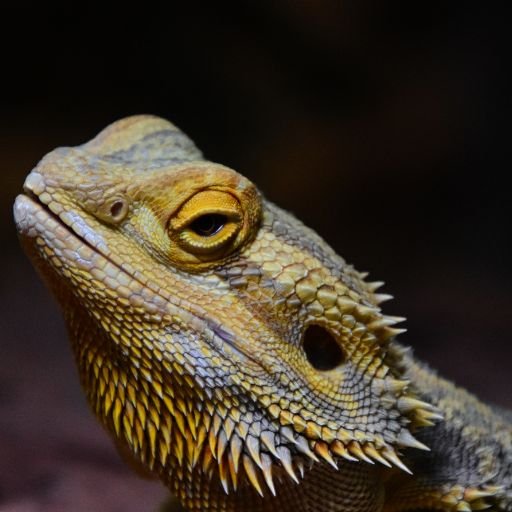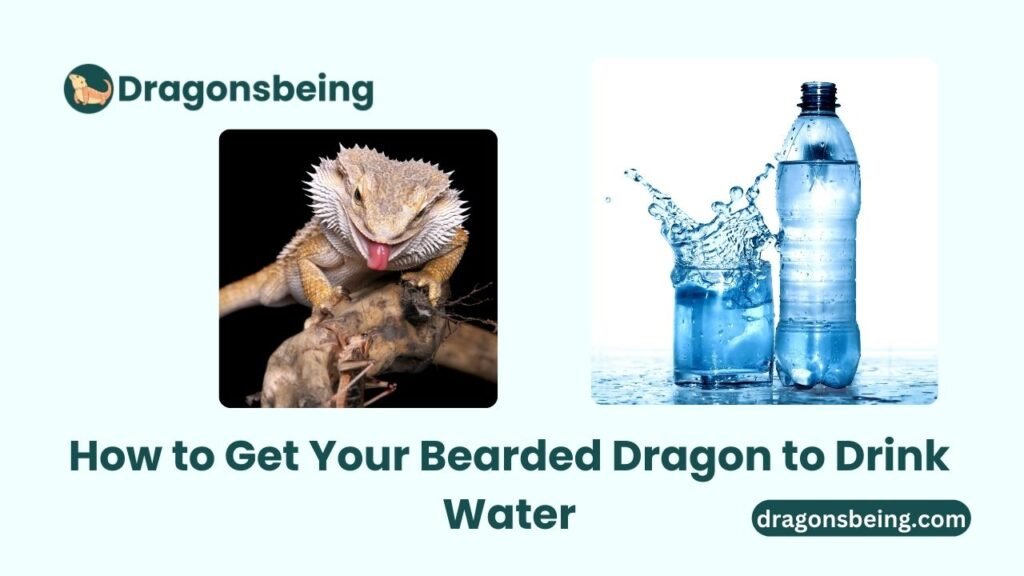To encourage your bearded dragon to drink water, offer fresh water in a shallow dish daily. Mist your dragon lightly with water to stimulate drinking.
Bearded dragons need proper hydration for overall health and well-being. Dehydration can lead to serious health issues, making it essential to ensure they drink enough water. These reptiles often do not drink water as readily as other pets. They may rely more on moisture from their food.
Providing water in a shallow dish encourages them to drink. Regular misting can also help them stay hydrated. Understanding your bearded dragon’s hydration needs is crucial for their vitality. Creating a suitable environment will promote drinking and contribute to their happiness and longevity.
Introduction To Bearded Dragon Hydration
Bearded dragons need proper hydration for health. Water is vital for their well-being. Understanding their hydration needs helps keep them happy and active.
Importance Of Water For Bearded Dragons
Water plays a key role in a bearded dragon’s life. Here are some reasons why:
- Digestion: Water aids in breaking down food.
- Temperature Regulation: Helps maintain body temperature.
- Waste Removal: Supports kidney function and excretes waste.
- Skin Health: Prevents shedding issues.
Providing fresh water daily is essential. Always ensure the water is clean and free of chemicals.
Dehydration Signs In Bearded Dragons

Recognizing dehydration early is crucial. Here are common signs:
| Sign | Description |
|---|---|
| Sunken Eyes | Eyes appear hollow or sunken. |
| Dry Skin | Skin feels rough or flaky. |
| Loss of Appetite | Dragon shows little interest in food. |
| Weakness | Less energy or lethargy is noticeable. |
Monitor your dragon closely. Early detection helps prevent serious issues.
Natural Drinking Habits
Understanding how bearded dragons drink water is vital for their health. In the wild, these reptiles have unique habits for staying hydrated. Mimicking these habits helps pet owners provide proper care.
Understanding Bearded Dragons In The Wild
Bearded dragons are native to Australia. They thrive in arid environments with limited water sources. Here’s how they drink in the wild:
- They absorb moisture from food.
- They drink from dew on plants.
- They use shallow pools of water.
These natural behaviors ensure they get enough hydration. Pet owners must consider these habits.
Mimicking Natural Environments
Creating a natural environment is essential for your bearded dragon. This encourages them to drink more water. Here are some ways to mimic their habitat:
| Method | Description |
|---|---|
| Provide Fresh Greens | Offer leafy greens like kale and collard greens. |
| Use Shallow Water Dishes | Place shallow dishes for easy access. |
| Spray Water | Lightly mist the enclosure to create humidity. |
Follow these tips to help your bearded dragon drink more water.
- Change water daily.
- Keep dishes clean.
- Monitor their hydration levels.
Creating A Thirst-inducing Habitat
Bearded dragons need proper habitats to encourage drinking. A well-designed terrarium helps them feel comfortable. This comfort can lead to increased water intake. Let’s explore how to create the perfect environment.
Optimal Terrarium Conditions
Setting up the right terrarium conditions is crucial. Here are some key factors:
- Temperature: Maintain a basking area of 95-105°F.
- Cool side: Keep it around 75-85°F.
- Lighting: Use UVB lighting for at least 12 hours daily.
These conditions mimic their natural habitat. Ensure the terrarium is spacious. A larger space encourages movement and exploration.
The Role Of Humidity
Humidity plays a vital role in hydration. Bearded dragons thrive in specific humidity levels. Aim for 30-40% humidity.
| Humidity Level | Effect on Bearded Dragons |
|---|---|
| Below 30% | Dehydration risk increases. |
| 30-40% | Optimal for hydration. |
| Above 40% | Possible respiratory issues. |
Use a hygrometer to monitor humidity levels. Mist the terrarium lightly to boost humidity. Avoid excessive misting. Too much moisture can lead to health problems.
Water Sources For Your Pet
Providing the right water sources for your bearded dragon is essential. Hydration impacts their health and well-being. Explore effective ways to ensure your pet stays hydrated.
Water Bowls
Water bowls are a common choice for many pet owners. They offer a simple way for your bearded dragon to drink water. Consider these points:
- Choose a shallow bowl to avoid drowning.
- Use ceramic or glass bowls. They are sturdy and easy to clean.
- Change the water daily to keep it fresh.
Place the bowl in a warm area. This encourages your dragon to drink. Monitor the water level regularly. Refill it as needed.
Drip Systems
Drip systems provide a continuous water supply. They mimic natural rain, which can attract your bearded dragon. Here are some benefits:
- Reduces water stagnation.
- Encourages more drinking behavior.
- Easy to set up and maintain.
Consider installing a small drip system in the enclosure. Position it above the basking area. This keeps the water warm and appealing.
Check the drip rate often. Adjust it to ensure a steady flow. This method can enhance hydration in your pet.
Encouraging Drinking Through Food
Bearded dragons often get hydration from their food. Offering the right foods can encourage them to drink more water. The right moisture-rich foods can help your pet stay healthy.
Hydrating Foods For Bearded Dragons
Choose foods with high moisture content. Here are some excellent options:
| Food | Moisture Content (%) |
|---|---|
| Collard Greens | 90% |
| Mustard Greens | 91% |
| Romaine Lettuce | 95% |
| Cucumber | 96% |
| Watermelon | 92% |
Incorporate these hydrating foods into their diet. This will help increase their water intake.
Feeding Techniques
Use effective feeding techniques to encourage drinking. Here are some methods:
- Chop vegetables into small pieces.
- Mix water-rich foods with dry foods.
- Offer food in a shallow dish.
- Hand-feed occasionally to stimulate interest.
Experiment with different combinations. This keeps mealtime exciting. Always ensure fresh water is available. Clean the water bowl daily to encourage drinking.
Bathing Your Bearded Dragon
Bathing your bearded dragon is essential for hydration. Many dragons don’t drink enough water. A bath can encourage them to drink. It also helps with shedding and skin care.
Bath Time Benefits
- Hydration: Soaking helps increase water intake.
- Shedding: Moisture aids in shedding old skin.
- Cleanliness: Bathing removes dirt and debris.
- Temperature Regulation: Helps regulate body temperature.
Regular baths promote good health. They can also be a fun experience for your dragon.
How To Safely Bathe Your Dragon
- Gather Supplies: Use a shallow tub or sink.
- Water Temperature: Make sure the water is lukewarm.
- Fill the Tub: Use about 1-2 inches of water.
- Gently Place Your Dragon: Support them as you lower them in.
- Supervise: Always watch your dragon during the bath.
- Duration: Limit bath time to 10-15 minutes.
- Drying: Use a soft towel to dry your dragon after.
Keep the bath environment calm. Avoid loud noises and sudden movements. This makes bath time enjoyable.
Monitoring And Maintaining Hydration
Keeping your bearded dragon hydrated is vital for its health. Proper hydration affects digestion, energy levels, and overall well-being. Regular monitoring ensures your pet stays hydrated and happy. Use these methods to track and maintain hydration.
Regular Check-ups
Schedule regular check-ups with a vet experienced in reptiles. They can spot signs of dehydration early. During these visits, discuss hydration needs specific to your dragon’s age and size.
- Check for signs of dehydration:
- Sunken eyes
- Dull skin
- Less active behavior
- Ask the vet about proper hydration techniques.
- Keep a record of your dragon’s health.
Hydration Tracking Methods
Track your bearded dragon’s hydration levels using these simple methods:
| Method | Description |
|---|---|
| Water Bowl Monitoring | Check if the water level decreases daily. |
| Hydration Spray | Spray water on your dragon and observe behavior. |
| Submerging | Soak your dragon in shallow water weekly. |
Record changes in drinking habits. Look for patterns in water intake. Adjust care based on these observations.
Remember, hydration is key to a healthy, active bearded dragon.
Common Mistakes To Avoid
Getting your bearded dragon to drink water can be tricky. Many owners make mistakes. Avoiding these common errors helps keep your dragon hydrated.
Overwatering Concerns
Giving too much water can harm your bearded dragon. Here are some common issues:
- Frequent soaking can stress them.
- Too much water may lead to respiratory problems.
- Overhydration can cause diarrhea.
Use these tips to avoid overwatering:
- Provide fresh water daily.
- Use a shallow dish for drinking.
- Monitor water intake closely.
Misreading Bearded Dragon Behavior
Understanding your bearded dragon’s body language is essential. Misreading signs can lead to problems.
| Behavior | Possible Meaning |
|---|---|
| Head bobbing | Needs attention or is stressed. |
| Hiding | Feeling insecure or scared. |
| Stretching | May want to bask or drink. |
Watch for these signs:
- Look for signs of dehydration.
- Check if they bask frequently.
- Observe their eating habits.
Understanding these behaviors helps you provide better care.
When To Seek Veterinary Care
Ensuring your bearded dragon stays hydrated is crucial. Sometimes, dehydration can become severe. Knowing when to seek veterinary care can save your pet’s life. Look for specific signs that indicate serious issues.
Identifying Serious Dehydration
Recognizing dehydration early is vital. Here are key signs:
- Sunken eyes: Eyes appear hollow or sunken.
- Dry skin: Skin lacks elasticity and feels rough.
- Excessive lethargy: Your dragon seems unusually tired.
- Decreased appetite: Less interest in food or refusing to eat.
- Sticky mouth: Saliva may feel thick or tacky.
Monitor your bearded dragon closely. Any combination of these symptoms needs attention. Seek help immediately if you notice them.
Professional Help And Interventions
Take your bearded dragon to a vet if you suspect dehydration. A veterinarian will assess the situation. They may perform tests or check hydration levels.
Common interventions include:
- Fluids: Your vet may administer fluids via injection or IV.
- Medication: They might prescribe medications to stimulate appetite.
- Environment adjustments: Recommendations on improving your dragon’s habitat.
Early intervention leads to better outcomes. Don’t delay if you notice serious symptoms.
Frequently Asked Questions About Bearded Dragon to Drink Water
How Can I Encourage My Bearded Dragon To Drink?
To encourage your bearded dragon to drink, provide fresh water daily in a shallow dish. You can also mist their habitat lightly to increase humidity. Offering water-rich foods, like cucumbers or bell peppers, can help them stay hydrated. Observe their drinking habits and adjust accordingly.
What Are Signs Of Dehydration In Bearded Dragons?
Signs of dehydration in bearded dragons include sunken eyes, wrinkled skin, and lethargy. They may also refuse food and appear less active. If you notice these symptoms, increase their water intake immediately. Consulting a veterinarian is essential for proper care and treatment.
Can Bearded Dragons Drink From A Bowl?
Yes, bearded dragons can drink from a bowl. Ensure the bowl is shallow to prevent drowning. Change the water daily to keep it fresh and clean. Place the bowl in a warm area of the habitat to encourage drinking. Monitor their water intake regularly.
How Often Should I Mist My Bearded Dragon?
Misting your bearded dragon’s habitat once or twice a week is usually sufficient. However, adjust based on humidity levels and your dragon’s needs. Misting helps maintain hydration and supports shedding. Always ensure they have access to fresh water in addition to misting.
Conclusion
Getting your bearded dragon to drink water is essential for their health. By incorporating these simple methods, you can encourage hydration effectively. Remember to monitor their drinking habits regularly. With patience and the right techniques, your pet will stay healthy and happy.
A well-hydrated bearded dragon is a thriving companion.

Hi, I’m Dr. Michelle Mayers, a veterinary professional with a deep passion for animal health and well-being. Over the years, I’ve dedicated my life to caring for animals and helping pet owners better understand their furry, feathered, or scaly companions. On my blog, Dragonsbeing, I share insights, tips, and stories that aim to educate, inspire, and connect with fellow animal lovers. Join me at Dragonsbeing as we explore the fascinating world of veterinary care and celebrate the special bond between humans and animals!


